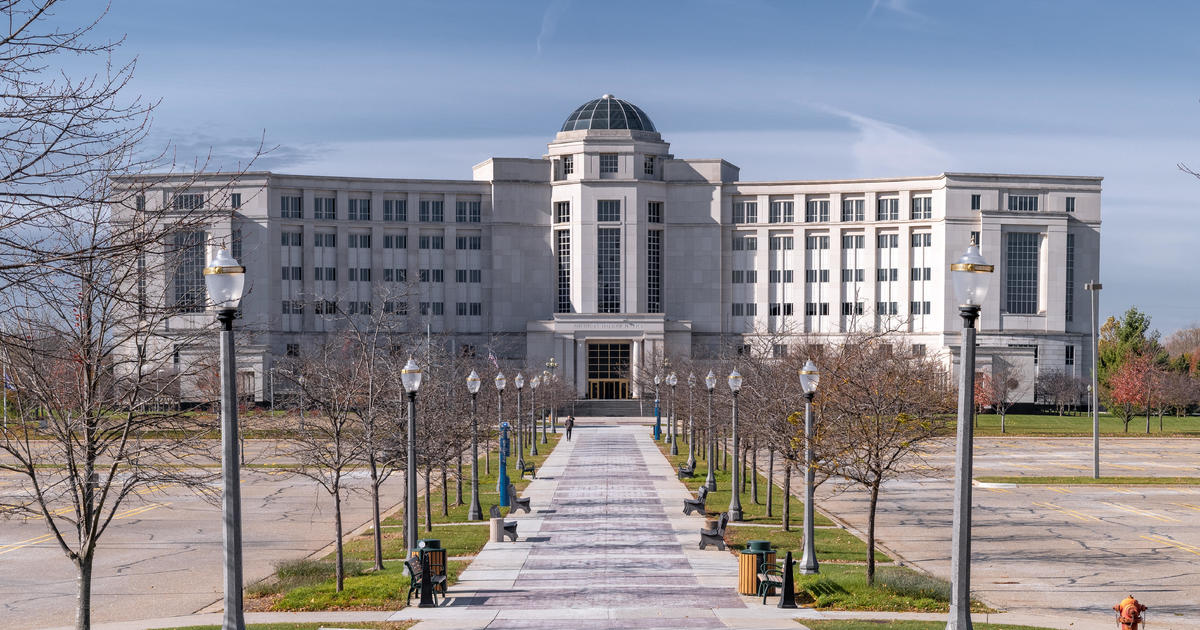Snyder Unveils $52B Budget, Tax Cut For Homeowners
LANSING (WWJ/AP) - Gov. Rick Snyder on Wednesday proposed a $52 billion state budget that includes a tax break for moderate-income homeowners and a six percent funding boost for public universities that have seen their state aid slashed in the last decade.
The Republican governor called for restoring the Homestead Property Tax Credit to additional homeowners and changing how it's calculated so that qualifying residents could get a bigger break. The tax break would be retroactive to last tax year and continue into the future.
In 2011, Snyder and Republican lawmakers made many households ineligible for the tax break as part of a business tax cut. The credit is currently available to homeowners with household income below $50,000 and whose home's taxable value is below $135,000. Snyder's plan would raise the income threshold to $60,000 and change a calculation so qualifying homeowners get more money back. Refund checks would go out this summer, about $79 per qualifying resident, and Snyder estimates 1.3 million residents could benefit overall.
"This is about fueling Michigan's future in a very positive, constructive way," Snyder, who is up for re-election in November, told budget-writing lawmakers gathered in the Capitol. "Michigan is back on track."
Overall spending would increase about two percent from the current fiscal year, Snyder said.
Click here to see the complete budget (.pdf format)
As expected, Snyder officially asked legislators to commit state funds to help Detroit as the bankrupt city tries to shore up pension funds that are billions in debt and prevent valuable city-owned art from being sold. About $17.5 million would come from the state in the first year of a 20-year, $350 million state commitment.
Snyder also called for a six percent funding increase for Michigan's public universities. Their funding is down one-third from just seven years ago and was cut significantly in his first year in office. Overall spending on K-12 schools would rise about three percent, with the traditional per-pupil grant increasing from $83 to $111 per student. Michigan's 28 community colleges would get a three percent funding increase as well.
Snyder also proposed extra money for road and bridge maintenance thanks in part to a nearly $1 billion surplus over three years, giving up -- for now -- on his stalled proposal to raise gasoline taxes and vehicle registration fees. He asked lawmakers to set aside roughly $250 million of the surplus, strictly for the transportation budget.
Lt. Gov. Brian Calley called Snyder's plan "a taxpayer's budget."
"Many of the investments we're making in areas such as transportation, public safety and human services will save money in the long run. Our growing economy also allows us to give many Michiganders significant tax relief through our initiative to enhance the Homestead Property Tax Credit. This is a responsible, forward-looking budget that recognizes the needs of taxpayers and continues Michigan's exciting momentum," Calley said in a statement.
The goal is to pass the state's budget by June 1. The state's new fiscal year begins Oct. 1.
Lonnie Scott of Progress Michigan said he's not surprised by the governor's proposed budget especially in an election year .
"Certainly we are excited that he would want to put more money back into education, but it definitely doesn't undo the cuts that he had made in the past three years," Scott said.
"Specifically: higher education. I mean, he is proposing a six percent increase in funding, but three years ago he cut 15 percent his first year in office," Scott said.
The Michigan Federation of Teachers weighing-in as well saying that the increase in funding does not make up for the previous cuts.
Highlights of the recommended budget include:
Educating our Children
• An additional $65 million for the Great Start Readiness Program, eliminating the waiting list for early education and establishing a strong foundation for effective learning.
• A total of $2 million in new funding to pilot year-round school programs, which will encourage schools to consider balanced school calendars to improve learning.
• $7.3 million to provide greater support to financially distressed school districts.
• $27.8 million for the phased-in implementation of evaluation tools and systems for teachers and administrators.
• An increase of $270 million for K-12 to fund the retirement liabilities within the school retirement system over and above the employer share, which is now capped at 20.96 percent. This ensures that retirement promises made to teachers can be kept.
Ensuring a Healthier Michigan
• An investment of $71.7 million for the Healthy Michigan Plan to implement expanded Medicaid coverage.
• $15.7 million in gross funding to expand the Healthy Kids Dental program into Kalamazoo and Macomb counties, providing an additional 100,000 children with good dental care.
• A total of $15.6 million to support the initiatives as recommended in the Mental Health Commission final report that was issued Jan. 21.
Investing in Job Creation and Infrastructure
• $254 million to match federal aid and maintain Michigan's roads and bridges, transit services and aeronautics projects across the state.
• A $5 million investment for the Automotive, Engineering and Manufacturing Technology Fund, a strategic initiative focusing on growing this important segment of the economy.
• $2 million in new funding for the Pure Michigan marketing campaign, bringing the total investment to $31 million in fiscal year 2015.
• An increase of $15 million in funding for community revitalization and business attraction efforts.
• $100 million in bond funds ($7.9 million for debt service) to allow universities with accredited engineering programs to compete for capital improvements to help increase the number of engineers and retain them in Michigan.
• $50 million in bond funds ($4.6 million for debt service) to allow community colleges to compete for funds to re-tool equipment for high-wage, high-skill and high-demand occupations.
• $2 million in new funding will be devoted to supporting arts education, encouraging creative and innovative works of art, and broadening cultural understanding.
Serving Seniors, Veterans and New Americans
• $5 million to expand the distribution of home-delivered meals for seniors and to expand other in-home services. Another $9 million is provided for the MI Choice Waiver program, eliminating waiting lists and making Michigan the "no wait" state.
• A total of $5 million in new funding to establish and support a state tuition assistance program for eligible Air and Army National Guard personnel.
• $385,000 for the creation of the Office for New Americans, driving strategies for attracting job-creating immigrants to Michigan.
• $1 million in new funding for the prevention of elder abuse, providing for increased awareness of the new penalties as well as training for medical and financial professionals.
Making Michigan Safer
• $17.8 million to train an additional 100 troopers and 31 motor carrier officers through the Michigan State Police Training Academy to patrol Michigan roadways and communities.
• $25.3 million in new funding to replace equipment within the Michigan Public Safety Communications System, helping ensure that emergency first responders can communicate during times of crisis and respond to distress calls quickly.
• $1.6 billion to operate a safe and secure prison system that currently houses 43,700 prisoners. Total corrections funding is set at $2 billion and includes probation, parole, and community support.
• $510,200 for the Office of the Children's Ombudsman, enhancing the investigation of complaints concerning children who for reasons of abuse or neglect are supervised by the Department of Human Services or its private contracted agencies.
• $500,000 to expand initiatives focused on anti-bullying and hate crimes.
Protecting and Enhancing Our Natural Resources
• A total of $6 million to prevent the invasion of species that could do harm to Michigan's natural resources and quality of life.
• A total of $3.5 million to hire and train 25 additional Department of Natural Resources conservation officers. Coupled with the new conservation officers currently in training, this brings the total number of conservation officers to 227, up from 186 in 2010.
• $2.5 million for the development of a trail system from Belle Isle to the Wisconsin border, with the overall vision of making Michigan the "Trail State."
• $4 million to support a new water quality initiative to provide a comprehensive water strategy designed to build healthy ecosystems.
• An additional $1 million for a statewide recycling initiative to increase the number of counties providing convenient access to recycling.
Encouraging Good Government/Helping Local Government
• $17.5 million annually for 20 years is set aside in tobacco settlement reserves to resolve ongoing issues in the bankruptcy of Detroit and help minimize impacts to pensioners.
• $36 million in increased support to local governments for the Economic Vitality Incentive Program, enhancing incentive-based funding, helping high-need communities and rewarding others adopting best practices.
• $764.9 million in constitutional revenue sharing payments and $211.2 million in county payments.
• $10 million in emergency reserve funds for school districts at risk of closure during a school year and for districts that may have to enroll students from a dissolved district.
Maintaining and Ensuring Fiscal Responsibility
• A deposit of $120 million to the Budget Stabilization Fund (Rainy Day Fund), bringing the total balance to $700 million.
• A deposit of $122 million to the newly created Michigan Health Savings Fund to offset future health care costs. When combined with the Rainy Day Fund balance of $700 million, the total in state savings is $822 million.
TM and © Copyright 2014 CBS Radio Inc. and its relevant subsidiaries. CBS RADIO and EYE Logo TM and Copyright 2014 CBS Broadcasting Inc. Used under license. All Rights Reserved. This material may not be published, broadcast, rewritten, or redistributed. The Associated Press contributed to this report.



